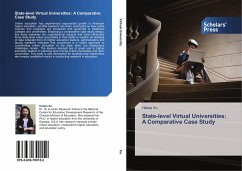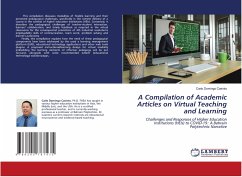Online education has experienced exponential growth in American higher education, yet little research has been conducted on how online courses and programs are structured and governed in traditional colleges and universities. Employing a comparative case study design, this study examines the organizational aspects that have influenced three state-level virtual universities in their ability to sustain. An analysis of data collected from 43 higher education leaders, administrators and faculty members indicates that consortium is a viable approach to coordinating online education at the state level, but tremendous challenges remain. The lessons learned are of great use to higher education leaders in planning and running virtual universities and open universities. This study is also informative for students and researchers who employ qualitative inquiry in conducting research in education.
Hinweis: Dieser Artikel kann nur an eine deutsche Lieferadresse ausgeliefert werden.
Hinweis: Dieser Artikel kann nur an eine deutsche Lieferadresse ausgeliefert werden.








